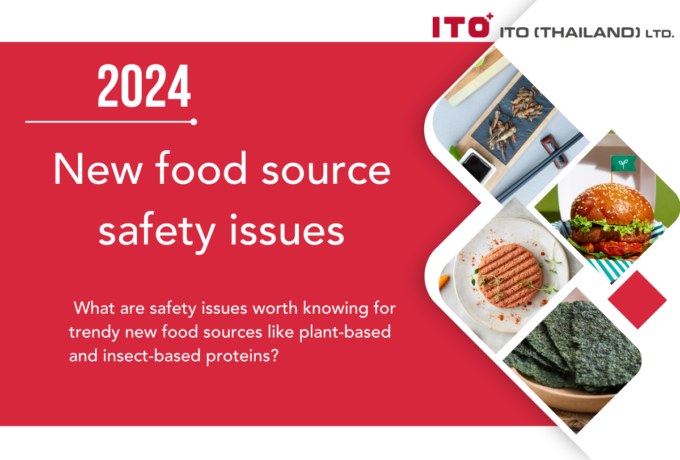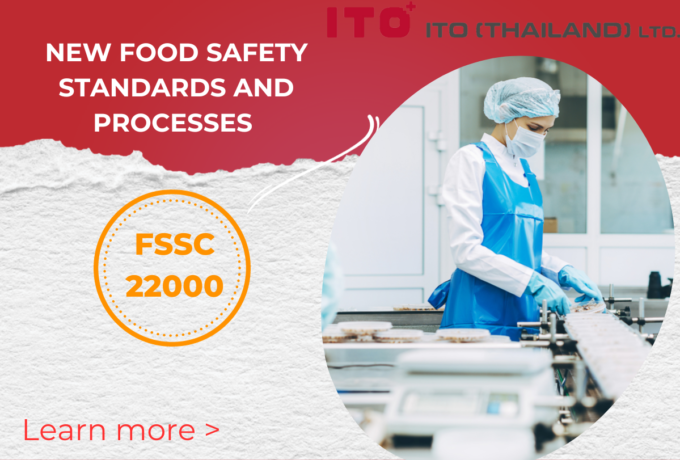ITO Thailand Hygiene Blog
Food Safety Culture
What is Food Safety Culture?
Food safety culture plays a crucial role in safeguarding the company’s reputation, ensuring the well-being of its employees, and providing a safe experience for its customers (3).
It refers to a company’s collective mindset, behaviours, and principles regarding food safety. It is related to the unique culture within a facility, encompassing the unobservable attitudes, convictions, behaviours, and regulations that govern its operations without supervision.
Compliance with legal food safety requirements is essential, and government-mandated audits and QSC (Quality, service, and cleanliness) inspections are in place to verify that facilities adhere to these guidelines. Embracing a strong food safety culture dramatically enhances a company’s performance during such inspections. The Global Food Safety Initiative (GFSI) is an international endeavour to promote food safety standards. In addition to meeting the basic legal requirements, they propose supplementary guidelines. Adhering to these recommendations empowers facilities to cultivate a workplace free from accidents, uphold a positive reputation, and achieve greater profitability (5).
The importance of Food Safety Culture
An organisation’s strong food safety culture is vital in enhancing customer loyalty by increasing the likelihood of customers choosing the business and recommending it to others. Building trust through a positive reputation for quality control and handling procedures is crucial for customer confidence in the products they consume.
Embracing a shared commitment to food safety nurtures innovation, improving processes, products, and services. This elevates food quality and enhances customer service, instilling greater confidence in the brand. Additionally, an innovative mindset attracts top talent, boosts employee satisfaction, and creates opportunities for cost reduction and revenue growth. The growing food safety industry offers numerous possibilities, attracting individuals seeking to build their careers in entry-level and advanced positions. Moreover, following food safety regulations and best practices set the business apart from competitors, demonstrating the dedication to customers’ well-being.
Finally, a robust food safety culture simplifies meeting regulatory requirements, ensuring the business fully complies with all food-related laws (2).
Developing a Food Safety Culture in the Food Supply Chain
In general, five factors influence the development of a food safety culture (4).
1.Leadership Engagement and Commitment – Establishing a food safety culture requires proactive leadership involvement. Larger businesses need collaboration among all leaders to define the vision, outline plans, and set clear goals. Pursuing relevant certifications and providing comprehensive guidelines to managers and department heads facilitate successful implementation and team guidance.
2.Highlight the Importance of Food Safety – Managers should communicate the importance of a food safety culture and company objectives to employees, providing reasons behind guidelines and offering rewards for compliance. Collecting employee feedback through a food safety questionnaire can further enhance safety in food production processes.
3.Provide Employee Training and Establish Clear Standards – Train employees on essential food safety practices, such as using new cleaning chemicals and packaging methods. Educate them on inspecting raw ingredients and managing common food safety hazards to ensure business success in food safety.
4.Provide Workforce with the Necessary Tools and Resources – Enhance employee capabilities with suitable equipment and adopt digital food safety management systems, leveraging AI-based tools and real-time dashboards. Automated checklists and free resources further promote effective food safety practices, making the overall process easier and more efficient.
5.Monitor – Consistent monitoring of food safety procedures, such as self-inspections and checking handwashing practices, cleanliness, and adherence to food safety rules, is essential for successful food safety programs and continual improvement.
The Benefits of Food Safety Culture (1)
Regulatory Compliance
Food safety culture practices are becoming increasingly essential due to evolving legislation worldwide. The European Commission plans to include food safety culture as a general principle in its regulations to enhance employee awareness and behaviour in food establishments. Similarly, the US FDA has integrated Food Safety Culture requirements in its New Era of Food Safety Blueprint. Australia and New Zealand have also introduced food safety culture assessments in the dairy industry to monitor and address related matters. As these requirements become prevalent in various regions, food safety culture assessments will ensure compliance with relevant regulations. Adhering to these practices is a legal obligation and vital for improving food safety and preventing hazards in food establishments. Therefore, companies must embrace food safety culture as a fundamental aspect of their operations to safeguard consumers, enhance their reputation, and meet regulatory demands.
Reducing non-conformities
Not only has GFSI embraced food safety culture requirements, but they are also integrated into all BRCGS Standards. Given the widespread recognition of GFSI and BRCGS, adhering to these standards enhances the likelihood of securing contracts with brands that acknowledge and value both certifications.
Business performance benefits
A food safety culture assessment is essential to meet regulatory requirements and satisfy BRCGS and GFSI standards. Moreover, it offers financial benefits by reducing incidents and waste. Human error contributes to 10.9% of food waste, while businesses with a strong food safety culture experience 54% fewer errors. Conducting a food safety culture assessment can lead to an 85% reduction in incident risk, minimising losses and improving financial performance. By embracing this assessment, companies not only fulfil compliance needs but also enhance their bottom line, making it a valuable and strategic approach to improving overall operations.
References
1.(2021). 3 ways Food Safety Culture can benefit your business. Retrieved July 23, 2023, from https://www.brcgs.com/about-brcgs/news/2021/3-ways-food-safety-culture-can-benefit-your-business/
2.Dalal, A. (2022). Food Safety Culture — What Is It And Why Is It Important? Retrieved July 23, 2023, from https://coggno.com/blog/food-safety-culture-what-is-it-and-why-is-it-important/#Why_Is_Food_Safety_Culture_Important
3.Greenlee, S. (2019). The Importance of Food Safety Culture. Retrieved July 23, 2023, from https://safefoodalliance.com/management/the-importance-of-food-safety-culture/
4.Hanson, E. M. (2022). Implementing a food safety culture in 2023. Retrieved July 23, 2023, from https://www.fooddocs.com/post/food-safety-culture
5.Motiwalla, A. (2021). The importance of food safety culture: the basics and more. Retrieved July 23, 2023, from https://www.monitorqa.com/food-safety-culture/
Related Post
-

New food source safety issues
What are safety issues worth knowing for trendy new food sources like plant-based and insect-based proteins?
-

British Retail Consortium (BRC) Standard
Food safety management systems play a vital role in ensuring the production and distribution of safe and high-quality food products to consumers. With the global food supply chain becoming increasingly complex, food businesses must implement effective systems prioritising safety, quality, and compliance with industry standards. A food safety management system encompasses a set of procedures, processes, and controls designed to identify, prevent, and manage potential hazards at every stage of the food production and supply process. This proactive approach not only safeguards consumers' health but also protects the reputation and credibility of food companies in an ever more competitive market.
-

Food Science in the World of Food Gastronomy (Part 1)
How can food science be applied to create new dishes?
-

FSSC 22000
Food manufacturers must ensure food safety standards and processes. FSSC 22000 is an official certification program for Food Safety Management Systems (FSMS) recognised by the Global Food Safety Initiative (GFSI). This certification scheme offers a set of guidelines and procedures to ensure uniformity, openness, and safety across your entire supply chain. It applies to all companies operating within the food and beverage industry, ranging from farmers to retailers. By fulfilling the necessary criteria and obtaining FSSC 22000 certification, it is demonstrated that the required standards for food quality and implementing effective processes to manage and mitigate risks associated with food fraud, foodborne illnesses, expensive recalls, and other external threats are met.
-

Food Safety Aspects of Artificial Sweeteners
Artificial sweeteners, also known as sugar substitutes, non-nutritive sweeteners, or high-intensity sweeteners, are artificially produced compounds utilised in place of sucrose (table sugar) to add sweetness to food and drinks. Due to their significantly higher sweetness than regular sugar, only a fraction of artificial sweeteners (200 to 20,000 times less) is required to achieve an equivalent level of sweetness. Since the caloric contribution of these sweeteners, when used in such small quantities, is insignificant, they are often referred to as non-nutritive (4).
-

New food sources from under the sea
A new sustainable food source that is environmentally friendly and addresses resource scarcity issues, which is currently trendy! Let's get acquainted with the new food sources from the underwater world, such as seaweed and jellyfish.










